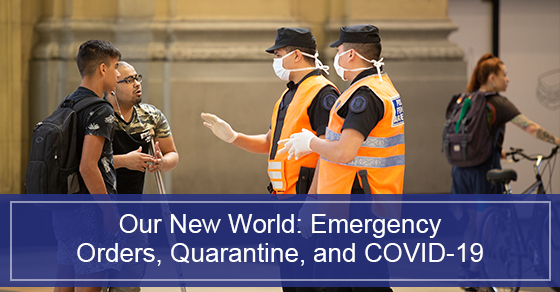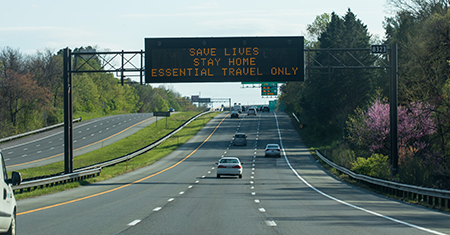Our New World: Emergency Orders, Quarantine, and COVID-19

Blog by Cassandra Beaulac and Arun S. Maini
What Is An Emergency Order?
Emergency orders are not new. We have just been lucky here in Ontario that they have not had to be used very often. In some U.S. states, for example, emergency orders are used every year to address natural disasters such as floods, wildfires, tornadoes and hurricanes. They are also available for keeping the peace against riots or other civil disturbances.
The we got COVID.
In order to slow the spread of COVID-19, the city of Toronto, the province of Ontario, and the government of Canada have taken measures that restrict the way in which we conduct business and move in public spaces.
A week following the closure of all Ontario schools, Ontario Premier, Doug Ford declared a state of emergency on March 17th in response to the pandemic. The Emergency Management and Civil Protection Act (1990) governs what can and be ordered during a state of emergency.
“Emergency” is defined in the Emergency Management and Civil Protection Act:
“Emergency” means a situation or an impending situation that constitutes a danger of major proportions that could result in serious harm to persons or substantial damage to property and that is caused by the forces of natures, a disease or other health risk, and accident or an act whether intentional or otherwise.
The Premier has the power to declare such an emergency if he or she is of the opinion that an “emergency” exists. An order of emergency can be made effective immediately. Premier Doug Ford (in consultation with various healthcare professionals at all levels of government) determined that the sudden outbreak of the Coronavirus constituted a major danger that could (and has) resulted in death and illness.
What Activities Can Emergency Orders Regulate?
Under the power of emergency orders, the government aims to protect the health, safety and welfare of the public. Emergency orders can provide profound restrictions on daily life. As we have experienced, this includes the ability to:
- Regulate and prohibit travel or movement to, from and within any specified area; and
- Close any place, whether public or private, including any business, office, school, hospital or other establishment or institution; and
- Procure necessary goods, services and resources.
What Emergency Orders Have Been Issued soFar Against COVID-19?
Many orders have been created under the powers of the declaration of emergency. One of such orders is the order banning public gatherings of more than five people:
Order – Ban on Organized Events and Social Gatherings of More than Five People
It is prohibited for any person to attend an organized public event of more than five people (this includes parades), a social gathering of more than five people, or a gathering of more than five people for the purposes of conducting religious services, rites or ceremonies. This prohibition applies regardless of whether the gathering of more than five people is public or private. However, there are exceptions to this order. These exceptions include gatherings of a single household (a family unit), or gathering for the purposes of a funeral service that is attended by not more than 10 people.
There have many various reports in the news media about people being charged for breaches of this order.
What is the Penalty for Breaching an Emergency Order?
Some of the penalties for breaching an Emergency Order are quite severe.
A person or corporation failing to comply with an order (or interfering or obstructing a person in the exercise of power or performance of duty conferred by an order) is guilty of an offence, and liable upon conviction:
- In the case of an individual, a fine of up to $100,000 and a term of imprisonment of not more than one year; and
- In the case of an individual who is a director or officer of a corporation, a fine of up to $500,000 and a term of imprisonment of not more than one year; and
- In the case of a corporation, a fine of up to $10,000,000.
Individuals can be found guilty of separate offences for each day that the offence occurs, so penalties can add up quickly.
What is the Quarantine Act?
The Quarantine Act (2005) imposes a legal obligation on all persons entering Canada from abroad to self-isolate for a period of 14 days. The Quarantine Act also allows the government of Canada toclose the borders or to make an order prohibiting the entry of any person into Canada if the government determines that a four-part-test is met:
(1) There is an outbreak of a communicable disease in the foreign country; and
(2) The introduction or spread of the disease would pose an imminent and severe risk to public health in Canada; and
(3) The entry of members of that class of persons into Canada may introduce or contribute to the spread of the communicable disease in Canada; and
(4) No reasonable alternatives to prevent the introduction or spread of the disease are available.
Order for All Persons Entering Canada to Self-Isolate for 14 Days
Pursuant to this order, any person entering Canada must self-isolate for a period of 14 days, and remain in isolation until the expiration of the 14-day period. While in self-isolation, individuals must monitor for symptoms of COVID-19.
Order for Ill Persons Entering Canada to Disclose and Isolate at State Facility if Unable to Self-Isolate
Pursuant to this order, symptomatic persons (those who have a fever, cough or difficulty breathing) are required to disclose their symptoms to the quarantine officer or screening officer upon arrival in Canada.
An individual is considered “unable to self-isolate” if they meet any of the following conditions:
(1) Must use a public means of transportation from the place they enter Canada to arrive at the place where they will isolate themselves; or
(2) The individual cannot isolate themselves for a period of 14 days in place where they will not be in contact with a“vulnerable person” or have access to the necessities of life. “Vulnerable person” in this context is to mean a person who has an underlying medical condition, has a compromised immune system from a medical condition or treatment, or a person who is at least 65 years of age. Having access to the “necessities of life” means that the individual must be able to provide for their shelter, clothing and food without having to go into the community to achieve this. An example of this would be a quarantined individual having the ability to access food by having groceries delivered.
If an individual cannot self-isolate, he or she will be transported to a quarantine facility, and remain in isolation for a period of 14 days.
There are a few exceptions to the self-isolation order for non-symptomatic persons. These include, for example:
- Flight crews; and
- Healthcare workers; and
- Persons who enter Canada to provide or transport essential medical equipment; and
- Any individual who provides an “essential service.”
What is the Penalty for Breaching an Emergency Order to Self-Isolate?
Individuals who fail to comply with the order to self-isolate as it relates to the Quarantine Act are guilty of an offence, and liable upon summary conviction to a fine of up to $750,000, or to an imprisonment for a term of up to six months, or both.
In the face of a disaster like COVID-19, Canada and its provinces have been fortunate to have available in their legislative toolbox the means to quickly and effectively take action to counter the fast-moving and deadly virus. This has enabled the public health authorities to buy valuable time to prepare, react and fight this once-in-a-lifetime crisis.
CassandraBeaulacis an articling student and a graduate of the University of Windsor Law School
Arun S. Maini is a criminal lawyer and former prosecutor with 25 years of experience.


